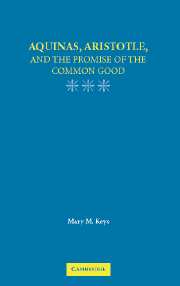Book contents
- Frontmatter
- Contents
- Acknowledgments
- PART I VIRTUE, LAW, AND THE PROBLEM OF THE COMMON GOOD
- 1 Why Aquinas? Reconsidering and Reconceiving the Common Good
- 2 Contemporary Responses to the Problem of the Common Good: Three Anglo-American Theories
- PART II AQUINAS'S SOCIAL AND CIVIC FOUNDATIONS
- PART III MORAL VIRTUES AT THE NEXUS OF PERSONAL AND COMMON GOODS
- PART IV POLITICS, HUMAN LAW, AND TRANSPOLITICAL VIRTUE
- Works Cited
- Index
1 - Why Aquinas? Reconsidering and Reconceiving the Common Good
Published online by Cambridge University Press: 25 July 2009
- Frontmatter
- Contents
- Acknowledgments
- PART I VIRTUE, LAW, AND THE PROBLEM OF THE COMMON GOOD
- 1 Why Aquinas? Reconsidering and Reconceiving the Common Good
- 2 Contemporary Responses to the Problem of the Common Good: Three Anglo-American Theories
- PART II AQUINAS'S SOCIAL AND CIVIC FOUNDATIONS
- PART III MORAL VIRTUES AT THE NEXUS OF PERSONAL AND COMMON GOODS
- PART IV POLITICS, HUMAN LAW, AND TRANSPOLITICAL VIRTUE
- Works Cited
- Index
Summary
This book began, appropriately enough in view of its topic, in the form of a “disputed question”: what benefit can contemporary political theory gain from engaging Aquinas's ethical and political thought, most specifically his concept of the common good (bonum commune)? From this “focal question,” again appropriately enough, a number of related queries arose, sometimes from the author herself and sometimes from her colleagues: Why should a book on the political common good focus more centrally on Aquinas than on Aristotle, Aquinas's mentor after all, and the founder in Politics III of common good–centered political theory? How does Aquinas navigate a key problem that seems intrinsic to the very concept of the common good, namely, how to give priority to the common good in social and civic life without undercutting or alienating the goods of individual persons? What for Aquinas is the nexus point of personal and civic flourishing, and how can locating and understanding that link alleviate the tension between personal and communal happiness? Finally, what about the religious or theological nature of most of Aquinas's works? Doesn't that limit their theoretical significance and restrict their credibility for most scholars today? Doesn't Aquinas's theological emphasis imply that only a closed community of Christian or even Catholic believers can identify with his thought, especially when it deviates from Aristotle's hard-headed philosophic reasoning? And if this is so, aren't we better off accepting a potentially less complete but nonetheless more tenable account of personal and common goods?
- Type
- Chapter
- Information
- Publisher: Cambridge University PressPrint publication year: 2006



